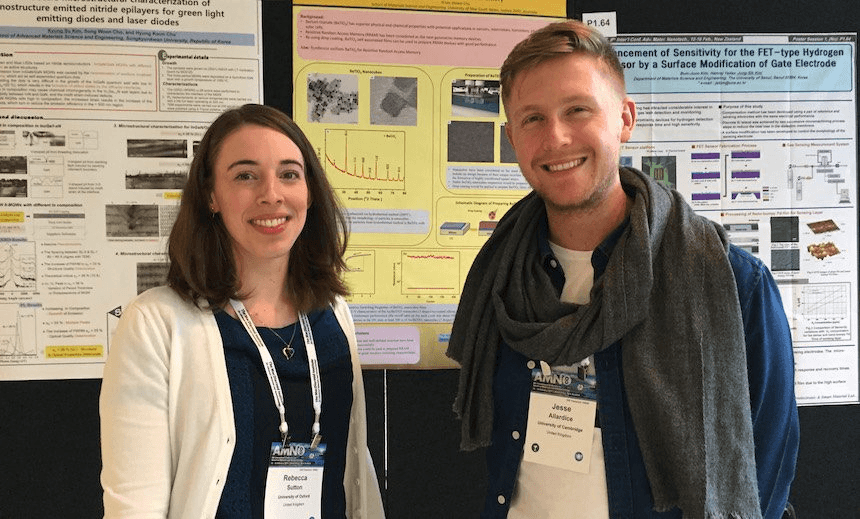Among the 500 delegates who have descended on the AMN8 conference in Queenstown from around the world are two New Zealand students who have taken their studies abroad. In his third blog post from AMN8, the advanced materials and nanotechnology conference hosted by The MacDiarmid Institute, Charles Anderson talks to them.
Rebecca Sutton and Jesse Allardice both studied material science focused on physics at Victoria University; now Rebecca is studying for her PhD in Physics at Oxford University and Jesse is doing the same at Cambridge.
They are also both using their skills to work with next generation solar cells. Rebecca is studying how perovskites, a class of crystals with a common structure, can create and transport energy much more efficiently that traditional silicon solar cells. Jesse works with materials that do the same thing but through a different method of photo multiplication – trying to get more energy put out by a cell than is put in.
During an afternoon tea break I caught up with them to talk about their work, why they wanted to head overseas, and the promise of one day returning home.
How did you guys end up studying solar power at Oxbridge?
Rebecca: I wanted to do a combination of material research and device making and something that would ultimately have some benefit. It’s important to me that the work I do has some benefit to the world around me.
Jesse: At some stage I had to figure out what I wanted to do and it hit me that I would only be able to push to do more study if it was something that would make a difference. I wanted to do something with real world impact. I mentioned to my supervisor that I was interested in solar energy and they put me in touch with all the people that I might be able to get scholarships through. I found out two days before submission deadline about this one in Cambridge but managed to get an application together.
But that could have been anything right? Studying a new generation of solar cells is pretty specific.
Rebecca: The perovskite solar cells have so much potential and they are getting better by the minute. When they threw themselves onto the research scene they were shown to increase efficiency from five per cent in traditional solar cells to 11 per cent. That’s enough to get anyone interested. Then if you make the cell out of a flat sandwich of just perovskite and a thin conducting material that showed to the world that it can transport the charge itself. It’s brilliant to work with a material like that.
Sounds like I should hold off getting serious about getting solar power until these things come out then?
Jesse: I don’t think so
Rebecca: Get silicon ones, they are good and they will pay back.
Jesse: And they are not that expensive
Rebecca: And in 20 years time when they are dead the perovskite technology will be really tried and tested. There are still a few questions about the full life time of the perovskite cell. So how will we manage these which contain a very small amount of lead which is readily accessible to the body. It’s very toxic. Small amounts but need to be controlled and contained.
One of the big pushes at this conference is turning academic work into real world businesses. Is that something that interests you guys?
Jesse: A start up project would be really rewarding but you probably have to do 10 for one to work. But if I could find something that would be really useful to the world that would be great. Academia can be a slow moving machine whereas businesses can start up really quickly and have a quicker impact. It’s that jump from making technology and letting it loose on the world which would be really interesting.
And coming back to New Zealand after going off and doing all this interesting work – is that something that you think about?
Rebecca: Absolutely, as you can see from this conference there is really exciting work going on in New Zealand.
Jesse: If I keep going in academia where have a few positions overseas then I would definitely come back but it’s a matter of if I get to that stage.
Rebecca: Having overseas experience gives you a new perspective. I know that’s cliche but it does show you how different universities do different things which makes you value how your own New Zealand university does things.
Jesse: That’s the good thing about New Zealand, you are not contained about what you have to learn, you can just keep going. And ending up in material science, having an idea about chemistry and maths as well as physics was really good.
Rebecca: I would say computing is underrated as well.
Jesse: Oh yeah.
You can’t do everything though can you?
Rebecca: You can fit a lot in.
Jesse: What I am discovering is that overseas universities they are very set. If you fail one paper you have to do the whole year again and you can’t do anything for six months. So the university system in New Zealand I love. The amount of things I could study was great.
Rebecca: They value the breadth overseas but coming back here makes me feel like I should have come back a couple of years ago.
But you have to change the world first right?
Rebecca: Right.
This is part of a series of articles for the Spinoff about and from AMN8, The Eighth International Conference on Advanced Materials and Nanotechnology, in Queenstown from February 12-16 2017. For details on public events in Christchurch, Wanaka, Queenstown and Nelson, click here. This content series is sponsored by the conference’s hosts, The MacDiarmid Institute for Advanced Materials and Nanotechnology, a national institute devoted to scientific research.


